formerly eScholarship Editions


|
|
|
|
Your search for
'History and Philosophy of Science' in subject
found 49 book(s). | Modify Search | Displaying 41 - 49 of 49 book(s) | |
| 41. | 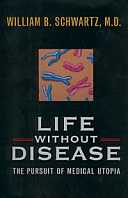 | Title: Life without disease: the pursuit of medical utopia Author: Schwartz, William B 1922- Published: University of California Press, 1998 Subjects: Science | Medicine | Economics and Business | History and Philosophy of Science | Public Policy Publisher's Description: The chaotic state of today's health care is the result of an explosion of effective medical technologies. Rising costs will continue to trouble U.S. health care in the coming decades, but new molecular strategies may eventually contain costs. As life expectancy is dramatically extended by molecular medicine, a growing population of the aged will bring new problems. In the next fifty years genetic intervention will shift the focus of medicine in the United States from repairing the ravages of disease to preventing the onset of disease. Understanding the role of genes in human health, says Dr. William B. Schwartz, is the driving force that will change the direction of medical care, and the age-old dream of life without disease may come close to realization by the middle of the next century. Medical care in 2050 will be vastly more effective, Schwartz maintains, and it may also be less expensive than the resource-intensive procedures such as coronary bypass surgery that medicine relies on today.Schwartz's alluring prospect of a medical utopia raises urgent questions, however. What are the scientific and public policy obstacles that must be overcome if such a goal is to become a reality? Restrictions on access imposed by managed care plans, the corporatization of charitable health care institutions, the increasing numbers of citizens without health insurance, the problems with malpractice insurance, and the threatened Medicare bankruptcy - all are the legacy of medicine's great progress in mastering the human body and society's inability to assimilate that mastery into existing economic, ethical, and legal structures. And if the average American life span is 130 years, a genuine possibility by 2050, what social and economic problems will result?Schwartz examines the forces that have brought us to the current health care state and shows how those same forces will exert themselves in the decades ahead. Focusing on the inextricable link between scientific progress and health policy, he encourages a careful examination of these two forces in order to determine the kind of medical utopia that awaits us. The decisions we make will affect not only our own care, but also the system of care we bequeath to our children. [brief] Similar Items |
| 42. | 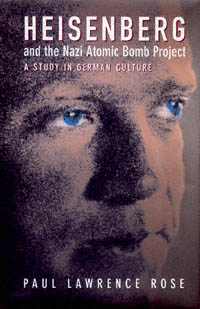 | Title: Heisenberg and the Nazi atomic bomb project: a study in German culture Author: Rose, Paul Lawrence Published: University of California Press, 1998 Subjects: History | European History | German Studies | European Studies | Science | Technology and Society | Physics | History and Philosophy of Science Publisher's Description: No one better represents the plight and the conduct of German intellectuals under Hitler than Werner Heisenberg, whose task it was to build an atomic bomb for Nazi Germany. The controversy surrounding Heisenberg still rages, because of the nature of his work and the regime for which it was undertaken. What precisely did Heisenberg know about the physics of the atomic bomb? How deep was his loyalty to the German government during the Third Reich? Assuming that he had been able to build a bomb, would he have been willing? These questions, the moral and the scientific, are answered by Paul Lawrence Rose with greater accuracy and breadth of documentation than any other historian has yet achieved.Digging deep into the archival record among formerly secret technical reports, Rose establishes that Heisenberg never overcame certain misconceptions about nuclear fission, and as a result the German leaders never pushed for atomic weapons. In fact, Heisenberg never had to face the moral problem of whether he should design a bomb for the Nazi regime. Only when he and his colleagues were interned in England and heard about Hiroshima did Heisenberg realize that his calculations were wrong. He began at once to construct an image of himself as a "pure" scientist who could have built a bomb but chose to work on reactor design instead. This was fiction, as Rose demonstrates: in reality, Heisenberg blindly supported and justified the cause of German victory. The question of why he did, and why he misrepresented himself afterwards, is answered through Rose's subtle analysis of German mentality and the scientists' problems of delusion and self-delusion. This fascinating study is a profound effort to understand one of the twentieth century's great enigmas. [brief] Similar Items |
| 43. |  | Title: America calling: a social history of the telephone to 1940 Author: Fischer, Claude S 1948- Published: University of California Press, 1994 Subjects: History | Sociology | United States History | Technology and Society | History and Philosophy of Science | American Studies Publisher's Description: The telephone looms large in our lives, as ever present in modern societies as cars and television. Claude Fischer presents the first social history of this vital but little-studied technology - how we encountered, tested, and ultimately embraced it with enthusiasm. Using telephone ads, oral histories, telephone industry correspondence, and statistical data, Fischer's work is a colorful exploration of how, when, and why Americans started communicating in this radically new manner.Studying three California communities, Fischer uncovers how the telephone became integrated into the private worlds and community activities of average Americans in the first decades of this century. Women were especially avid in their use, a phenomenon which the industry first vigorously discouraged and then later wholeheartedly promoted. Again and again Fischer finds that the telephone supported a wide-ranging network of social relations and played a crucial role in community life, especially for women, from organizing children's relationships and church activities to alleviating the loneliness and boredom of rural life.Deftly written and meticulously researched, America Calling adds an important new chapter to the social history of our nation and illuminates a fundamental aspect of cultural modernism that is integral to contemporary life. [brief] Similar Items |
| 44. |  | Title: The king's midwife: a history and mystery of Madame du Coudray Author: Gelbart, Nina Rattner Published: University of California Press, 1998 Subjects: History | European History | Women's Studies | Autobiographies and Biographies | French Studies | History and Philosophy of Science | Medicine Publisher's Description: This unorthodox biography explores the life of an extraordinary Enlightenment woman who, by sheer force of character, parlayed a skill in midwifery into a national institution. In 1759, in an effort to end infant mortality, Louis XV commissioned Madame Angélique Marguerite Le Boursier du Coudray to travel throughout France teaching the art of childbirth to illiterate peasant women. For the next thirty years, this royal emissary taught in nearly forty cities and reached an estimated ten thousand students. She wrote a textbook and invented a life-sized obstetrical mannequin for her demonstrations. She contributed significantly to France's demographic upswing after 1760.Who was the woman, both the private self and the pseudonymous public celebrity? Nina Rattner Gelbart reconstructs Madame du Coudray's astonishing mission through extensive research in the hundreds of letters by, to, and about her in provincial archives throughout France. Tracing her subject's footsteps around the country, Gelbart chronicles du Coudray's battles with finance ministers, village matrons, local administrators, and recalcitrant physicians, her rises in power and falls from grace, and her death at the height of the Reign of Terror. At a deeper level, Gelbart recaptures du Coudray's interior journey as well, by questioning and dismantling the neat paper trail that the great midwife so carefully left behind. Delightfully written, this tale of a fascinating life at the end of the French Old Regime sheds new light on the histories of medicine, gender, society, politics, and culture. [brief] Similar Items |
| 45. | 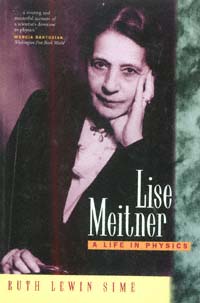 | Title: Lise Meitner: a life in physics Author: Sime, Ruth Lewin 1939- Published: University of California Press, 1997 Subjects: Science | Physics | Autobiographies and Biographies | Women's Studies | History | History and Philosophy of Science Publisher's Description: Lise Meitner (1878-1968) was a pioneer of nuclear physics and co-discoverer, with Otto Hahn and Fritz Strassmann, of nuclear fission. Braving the sexism of the scientific world, she joined the prestigious Kaiser Wilhelm Institute for Chemistry and became a prominent member of the international physics community. Of Jewish origin, Meitner fled Nazi Germany for Stockholm in 1938 and later moved to Cambridge, England. Her career was shattered when she fled Germany, and her scientific reputation was damaged when Hahn took full credit - and the 1944 Nobel Prize - for the work they had done together on nuclear fission. Ruth Sime's absorbing book is the definitive biography of Lise Meitner, the story of a brilliant woman whose extraordinary life illustrates not only the dramatic scientific progress but also the injustice and destruction that have marked the twentieth century. [brief] Similar Items |
| 46. | 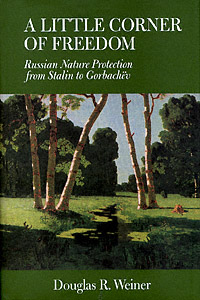 | Title: A little corner of freedom: Russian nature protection from Stalin to Gorbachëv Author: Weiner, Douglas R 1951- Published: University of California Press, 1999 Subjects: Russian and Eastern European Studies | Environmental Studies | Politics | History | History and Philosophy of Science | Ecology Publisher's Description: While researching Russia's historical efforts to protect nature, Douglas Weiner unearthed unexpected findings: a trail of documents that raised fundamental questions about the Soviet political system. These surprising documents attested to the unlikely survival of a critical-minded, scientist-led movement through the Stalin years and beyond. It appeared that, within scientific societies, alternative visions of land use, resrouce exploitation, habitat protection, and development were sustained and even publicly advocated. In sharp contrast to known Soviet practices, these scientific societies prided themselves on their traditions of free elections, foreign contacts, and a pre-revolutionary heritage.Weiner portrays nature protection activists not as do-or-die resisters to the system, nor as inoffensive do-gooders. Rather, they took advantage of an unpoliced realm of speech and activity and of the patronage by middle-level Soviet officials to struggle for a softer path to development. In the process, they defended independent social and professional identities in the face of a system that sought to impose official models of behavior, ethics, and identity for all. Written in a lively style, this absorbing story tells for the first time how organized participation in nature protection provided an arena for affirming and perpetuating self-generated social identities in the USSR and preserving a counterculture whose legacy survives today. [brief] Similar Items |
| 47. |  | Title: Nerves and narratives: a cultural history of hysteria in nineteenth-century British prose Author: Logan, Peter Melville 1951- Published: University of California Press, 1997 Subjects: Literature | History | History and Philosophy of Science | Literary Theory and Criticism | Victorian History | English Literature | Women's Studies Publisher's Description: The British middle class of the early nineteenth century was defined by its nervous complaints - hysteria, hypochondria, vapours, melancholia, and other maladies. Peter Melville Logan explores the link between medical theories of nervous physiology and narrative issues central to the literary writing of the period. He examines the assumption, implicit in medical thinking at the time, that the nervous body - unlike its non-nervous counterpart - has a narrative inscribed on its nerve fibers. It becomes "the body with a story to tell."Logan takes up several literary works whose nervous narrators connect their present disorder with an unnatural, unhealthy social order. Concentrating on novels by Godwin, Hays, and Edgeworth, and on De Quincey's Confessions of an English Opium-Eater , Logan weaves cultural phenomena such as crowd psychology and attitudes toward opium addiction into the basic paradigm of the nervous narrative. He explains why these social critiques always tended to promote the same distempered civilization that brought them into being. He then looks at the emergence of the working-class body in the 1840s, changing medical theories, and George Eliot's treatment of medicine in Middlemarch .Logan's book is especially valuable for its rethinking of disciplinary categories that separate medicine from literature and for bringing to light lesser-known literary texts. With a foreword by Roy Porter, it will be a welcome addition to literary, gender, and cultural studies. [brief] Similar Items |
| 48. | 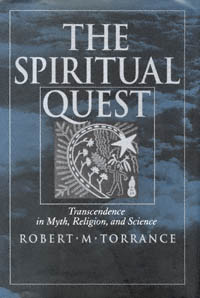 | Title: The spiritual quest: transcendence in myth, religion, and science Author: Torrance, Robert M. (Robert Mitchell) 1939- Published: University of California Press, 1994 Subjects: Religion | Indigenous Religions | Cultural Anthropology | Folklore and Mythology | Language and Linguistics | Philosophy | History and Philosophy of Science | Literature Publisher's Description: Robert Torrance's wide-ranging, innovative study argues that the spiritual quest is rooted in our biological, psychological, linguistic, and social nature. The quest is not, as most have believed, a rare mystical experience, but a frequent expression of our most basic human impulses. Shaman and scientist, medium and poet, prophet and philosopher, all venture forth in quest of visionary truths to transform and renew the world.Yet Torrance is not trying to reduce the quest to an "archetype" or "monomyth." Instead, he presents the full diversity of the quest in the myths and religious practices of tribal peoples throughout the world, from Oceania to India, Africa, Siberia, and especially the Americas. In theorizing about the quest, Torrance draws on thinkers as diverse as Bergson and Piaget, van Gennep and Turner, Pierce and Popper, Freud, Darwin, and Chomsky. This is a book that will expand our knowledge - and awareness - of a fundamental human activity in all its fascinating complexity. [brief] Similar Items |
| 49. | 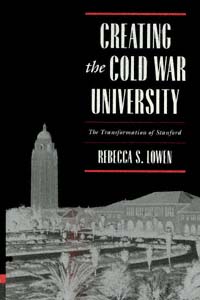 | Title: Creating the Cold War university: the transformation of Stanford Author: Lowen, Rebecca S 1959- Published: University of California Press, 1997 Subjects: History | Education | Technology and Society | Military History | Californian and Western History | History and Philosophy of Science | California and the West | Intellectual History | United States History | United States History Publisher's Description: The "cold war university" is the academic component of the military-industrial-academic complex, and its archetype, according to Rebecca Lowen, is Stanford University. Her book challenges the conventional wisdom that the post-World War II "multiversity" was created by military patrons on the one hand and academic scientists on the other and points instead to the crucial role played by university administrators in making their universities dependent upon military, foundation, and industrial patronage.Contesting the view that the "federal grant university" originated with the outpouring of federal support for science after the war, Lowen shows how the Depression had put financial pressure on universities and pushed administrators to seek new modes of funding. She also details the ways that Stanford administrators transformed their institution to attract patronage.With the end of the cold war and the tightening of federal budgets, universities again face pressures not unlike those of the 1930s. Lowen's analysis of how the university became dependent on the State is essential reading for anyone concerned about the future of higher education in the post-cold war era. [brief] Similar Items |